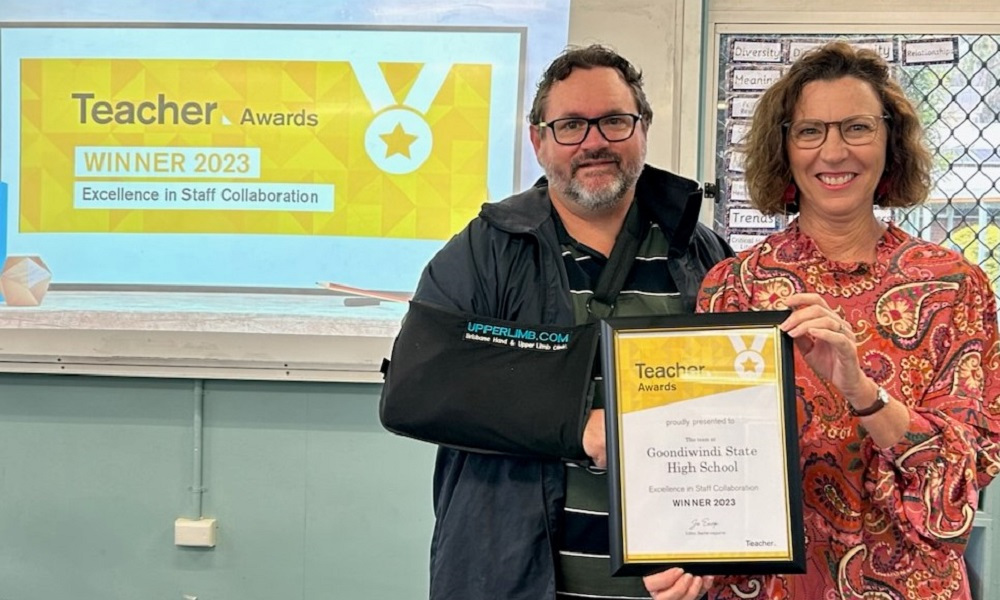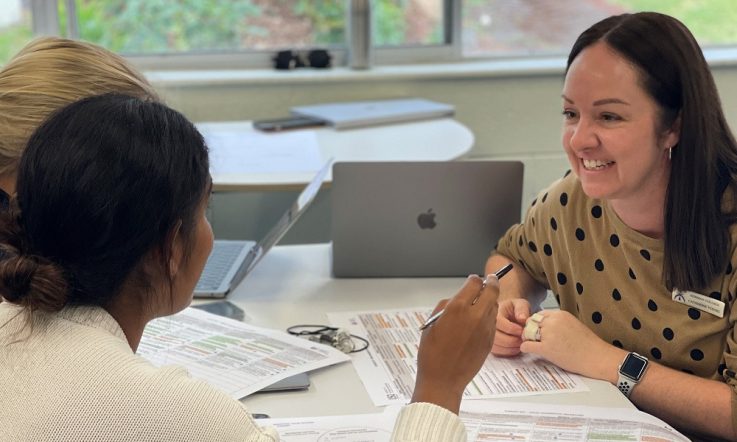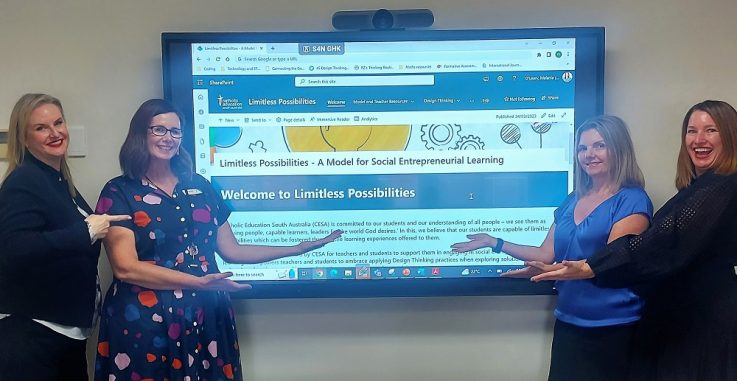The winners of the 2023 Teacher Awards have been announced. The impressive list of winners for our 8 award categories span 5 states and all school sectors. In today’s article, we speak with winners of the Teacher Awards 2023 in the Excellence in Staff Collaboration category. Bernadette Hawker and Brett Hallett from Goondiwindi State High School in Queensland share the story of how staff work collaboratively across faculty areas to improve student writing outcomes in all year levels and subject areas.
Research shows that high quality teaching and leadership teams learn from each other's practices, and there is a shared commitment and responsibility for student learning and ongoing progress. The Excellence in Staff Collaboration category of the Teacher Awards celebrates a team of leaders and teachers who are working together to improve their practice and lift student outcomes.
The 2023 winners of this category are the team at Goondiwindi State High School in Queensland. It is a rural school of approximately 500 students and 45 teaching and ancillary staff, located on the Queensland-New South Wales border. Almost a quarter of students are from an Aboriginal or Torres Strait Islander background.
In 2015, they began a project to address the longitudinal decline in their year 9 students’ NAPLAN Writing data. At that stage, they were 20.6% behind the nation. They decided to establish a Professional Learning Community (PLC) called STEAM – which stands for Sharing Teacher Expertise to Achieve Mastery. It is a voluntary PLC that meets fortnightly from 8 am to 8:40 am on Thursdays.
STEAM aims to address the question: 'How do we make the teaching of writing everyone’s responsibility?' and is all about working collaboratively in a high-quality teaching team to learn from each other's practices.
Facilitator of STEAM and Head of Department – Teaching and Learning (The Arts), Bernadette Hawker, says that in 2015 the program focused on year 8 teachers, with the hope that there would be some improvement over that year before students sat their NAPLAN tests in year 9.
‘What began as a small group of teachers committed to owning the teaching of writing in 2015, has grown to include the majority of our staff who inspire each other to be quality educators,’ Hawker tells Teacher.
Principal Brett Hallett says they designed the professional development to upskill all teachers on the basics of writing, whilst also ensuring they had the confidence to acknowledge when they needed extra support in a particular area.
‘If every teacher had the confidence and the capacity to be able to use the metalanguage related to sentence structure and to be able to teach students what makes up a simple sentence, what makes up a compound sentence, and the differences in between, how powerful would that be?’ he says.

STEAM in action
STEAM follows a similar process each term. In the first session, they collaboratively determine their writing focus based on analysis of a range of data. For example, their 2023 focus has been sentence structure. They use evidence-informed strategies to explicitly teach metalanguage associated with the writing focus (for example NAPLAN Writing criteria category descriptors) for shared understanding and consistency.
In session 2 and 3, they model evidence-informed strategies for the effective teaching of the writing skill. Generally, Hawker does most of the modelling, drawing on the considerable research she does to prepare, as well as using her own experience as a Senior English teacher, to ‘teach’ the teachers the strategies. Occasionally, other staff with specific expertise might model some strategies too. For example, Jodie Cross, a Science, HPE teacher came to Goondiwindi SHS from another school where they had done a lot of vocabulary work using the STRIVE program, so she as modelled some of that work to staff this year.
Between each session, teachers practice the strategies with their classes, share resources and observe one another teach where possible. In session 4, teachers share their experiences of teaching the skill over the term. They reflect on their learnings and improvements they’ve observed in student writing.
Hallett says he’s seen wonderful examples of teachers genuinely using strategies they’ve learned at STEAM to improve their practice.
‘I've seen examples where we've modelled something at STEAM, a teacher has taken that pedagogy or that strategy, they’ve copied it and utilised it in their classroom, and then we provide them with the opportunity to come and share that and celebrate that with the rest of the teachers that are there. Nothing gives STEAM members more joy than seeing a teacher proud and excited about something they learned at STEAM, something they delivered in their classroom and achieved success for their students,’ he shares.
As part of the judging criteria for the Teacher Awards, one of the elements our Judging Panel was looking for in this award category was an explicit system in place to deliberately foster collaboration and allow for regular professional discussions to share expertise, knowledge, and learnings across curriculum areas.
The judges commented: ‘This submission goes to the heart of passion and purpose in education. The capturing of moments where a staffing group understand the synergy between them and the task at hand. It demonstrates the connection between identification, intervention and successful outcome. It stood out as a submission for its heart, its focused approach to improvement and its celebration of collective responsibility among a staffing group’.
An established culture of sharing
Hawker says that a key reason for their longevity and success is the buy-in of influential staff who act as great role models for new and beginning staff.
‘Our Maths HOD, Julie Chapman and our English HOD, Di Dalziel, are 2 of our most experienced and well-respected people on staff and have been incredibly supportive from the very beginning. They attend every session and this great support and role modelling of the importance of literacy across all subject areas cannot be underestimated in terms of influencing others to also buy in and attend,’ she says.
Hallett says he also uses STEAM to display his own vulnerabilities in front of staff.
‘I haven't achieved mastery in terms of complex sentences. I haven't achieved mastery in terms of my vocabulary. I display that vulnerability in STEAM as an active participant, which allows others to do the same, even those that are less experienced. And they're like, ‘well, if Brett doesn't know then maybe it's OK for me to ask the silly question’ that's not silly at all,’ he shares.
Hawker asked members of STEAM what they like most about the PLC and these were some responses:
I love the sharing of ideas from other teachers. It goes so much beyond learning about teaching vocabulary or how to write a complex sentence. I feel motivated after each session to improve my practice in all areas of teaching when I see the enthusiasm towards teaching from my colleagues. (Michelle, Business/ICT)
The confidence and excitement I have gained in listening to a gigantic variety of literacy strategies; the collegiality; the deep respect for pedagogy and learning; the fun; the personal development; the inter-staff support. It is next level brilliant! (Carolyn, Subject Area Co-ordinator Drama)
That it allows teachers the opportunity to learn from others and also to interact with teachers outside our faculties, which doesn’t occur frequently in a high school setting (Julie, Maths HOD)
Hawker says they have seen improvements in their results since they first began.
‘We have been operating for 9 years and have not let up in supporting teachers to share and develop expertise, knowledge and learnings around the teaching of writing. By 2021, our NAPLAN results in year 9 Writing revealed we were above Queensland State Schools and similar to the nation. We have also significantly closed the gap between Indigenous and non-Indigenous students in year 9 Writing compared to our region and the state,’ she says.
Hawker says they also take the time to celebrate progress in teacher knowledge and confidence, which makes a big difference to teacher morale.
‘We might give an authentic round of applause to someone who willingly shares a great idea to the group in STEAM. With permission, we share STEAM members’ great resources developed from STEAM sessions with the whole staff via email and at our whole staff PD once a term. We provide multiple opportunities for teachers to share their work in STEAM and Master Class (our whole school compulsory PD once a term). We share great class results or STEAM success via the school newsletter and Facebook. I will often write little notes to individual members acknowledging great work,’ she says. ‘It is a lot about sharing the work that people are doing, giving them the opportunity to tell everyone about that and for us to be genuinely and authentically happy and proud of that work.’
Maintaining their momentum
Hallett says that the COVID-19 pandemic had a significant impact on all schools in relation to academic achievement. In 2017-19, 90% of year 7-10 students at Goondiwindi SHS were passing English, which was well above their like-schools according to regional data.
‘Then the pandemic occurred, and we had students not coming to school and we've got some disadvantaged families and students where the pandemic has provided an extra challenge, I suppose in their ability to consider school and learning as important. As a result, we've seen significant decline down to 70% in some cases in our students achieving the pass rate, so that's an increase of 20% of our students who are not achieving the pass rate,’ he shares.
This has given Hallett a renewed focus on fighting hard to speed up improvements in the students’ pass rates.
‘We're making some concrete plans to target our pass rates and our volume of students that get A's and B's – so, our higher performance students – we want to set ourselves some goals and targets. We're going to continue with STEAM, and we're going to advertise and encourage more people to be members of STEAM. And we're going to create teachers who are more data literate and are able to analyse their own performance and their own students’ performance, compare that not just to our cohort, but to other schools within the region to motivate ourselves to do the best for our individual students to improve their achievement rate,’ he says.

Hawker says that winning the Teacher Award this year is another way to encourage and inspire staff to keep going and maintain that momentum.
‘We are a little school, but we are fiercely determined to do the absolute best we can for our students. Brett and I share a passion for overcoming the disadvantage of so many kids. And the only way we can do that is through providing the best education we possibly can for all students and that's our moral imperative.
‘We have persevered despite our rural/remote location, our low ICSEA rating, and our transient staff. We have used research to empower one another. We have not let up because we have always known we must make a difference,’ she says.
The Teacher Awards recognise work that’s been completed in the past 12 months, so it’s not too early to start thinking about your nomination for 2024. You can browse the specific criteria for this award, and the other 7 categories, here, and our FAQ page for the Teacher Awards here.
Think about the culture of collaboration and teamwork at your school.
Do you have an explicit system in place to foster collaboration across curriculum areas and stages?
Do you have the opportunity to learn from other teachers and their practice? How do you share your successes with your colleagues?
Do you plan and review lessons collaboratively with your colleagues? What does this look like in practice?



